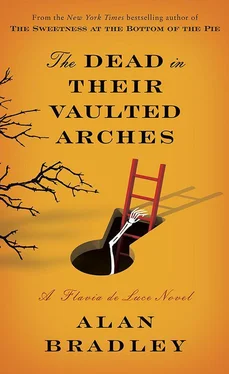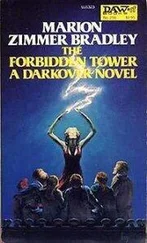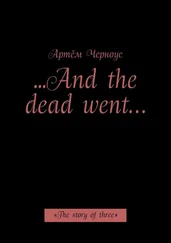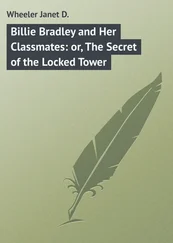I stared at myself in the looking glass. Who was this girl with her mother’s face? It was as if I were wearing a Harriet mask for Carnival and had not noticed it until now.
And, to tell the truth, it frightened me.
Breakfast at Buckshaw was always a glum affair, and this morning was no exception. Tristram and Adam were seated at the foot of the table, as if to keep a respectful distance from the grieving family.
Father, all in black, sat at the head, his palms flat on the table. He had touched not a crumb of his breakfast and it seemed unlikely that he would do so.
Beside him, Feely was a pale ghost, nibbling absently at a piece of dry toast. She needed to keep her strength up if she was to be at the organ for Harriet’s funeral.
Everyone from family to the vicar and his wife had tried to dissuade her, but all in vain. Feely was as steely cold in her stubborn resolve as only a wispy-looking musician can be.
Daffy, cocooned in some kind of comic, musty Victorian mourning outfit, was helping herself to another kipper. Her acid glance defied me to say anything.
When she was like this, even Father knew better than to risk a single word.
Aunt Felicity sat at the middle of the table, well apart from both groups, humming mindlessly to herself like a hive of distant bees.
Adam gave me the tiniest of nods before resuming his quiet conversation with Tristram, who did not give me so much as a glance. It was as if our early morning flight had been merely a dream—and perhaps it had. Perhaps it had never happened.
A time traveler, materializing at our breakfast table from some far future, would have supposed that Mrs. Mullet was the only one of us who was flesh and blood with the deceased.
Mrs. M, to be perfectly honest, looked a wreck. Her face was flushed, her eyes brimming with unshed tears, and her hair sticking out like jackstraws.
She fished a kipper and a couple of bangers from their serving dishes and placed them on my plate. Her lips were even more tightly pressed together than they had been before—as if they were now additionally secured by C-clamps.
She said not a word, and I realized in that instant how deep was her despair.
I reached out to touch her hand but she was already gone.
Breakfast broke up with no more than a few hushed words exchanged between the two guests at the foot of the table.
I excused myself and left the room. I would go to my laboratory and try to set down in my notes the confusion that was in my mind.
I was no more than halfway across the foyer when the doorbell rang. Dogger appeared from nowhere, as he often does so uncannily, and swung the heavy door back on its hinges.
Two delivery men in overalls, their arms filled with flowers, stood waiting. Behind them, on the gravel sweep, their van, open at the back, overflowed with bouquets, wreaths, and carpeted arrangements of carnations, cornflowers, arum lilies, and forget-me-nots all nestled in beds of Queen Anne’s lace. There were gladioli, peonies, and roses; marigolds, chrysanthemums, and irises.
It was as if the gardens of Heaven had been raided and the plunder delivered to our door with more than enough flowers to overflow the foyer.
In spite of the early hour, a fresh queue of mourners had already formed, snaking round the van and making a straggling half circle in the forecourt.
As the men spat on their hands and began the long job of moving the flowers into the house, Dogger produced a small notebook from his vest pocket and began carefully cataloging the names of the senders, which he read from the pasteboard cards attached to each arrangement.
It was as if all the world had known Harriet, and all the world in mourning had sent their floral tributes.
“Sorry about your mother,” a voice said at my ear. “Rotten bad luck. I should have hoped it would turn out better than this.”
I spun round, knowing already that it was Adam Sowerby, or, to give him the whole McGillicuddy—as it was so prominently printed on his card, which I still had tucked away in the pages of a recent notebook:
Adam Tradescant Sowerby, MA., FRHortS, etc .
Flora-archaeologist
Seeds of Antiquity—Cuttings—Inquiries
Tower Bridge, London E.1 TN Royal 1066
He was, of course, something of a fraud. While working in the guise of an archaeological botanist, retrieving and coaxing back into germination the seeds of plants and flowers thought to be long extinct, the man was actually an inquiry agent, or—to put it more plainly—a private detective.
When he learned of my recent successes, he had tried to recruit me as his partner in criminal investigation, but I had quickly discovered that the man took more than he gave. Worse than that, he had point-blank refused to tell me whom he was working for.
Since Adam was an old friend of Father’s, there wasn’t much that I could do to keep him off my pitch, but there was no law that said I had to cooperate.
“It must have been a very great shock,” he said, still talking, even though I hadn’t been listening.
I nodded and headed for the staircase.
“As must have been that poor bloke at the station.”
I stopped in my tracks. How did Adam know about that? Had he been there?
I thought he had only arrived last night. Had he already been in consultation with the police?
I could hardly believe that Inspector Hewitt would confide in a private inquiry agent—and a private inquiry agent from London, at that!
Of course, by now, the circumstances of the stranger’s death must be the talk of the village. Perhaps that was why some of the mourners had looked at me so oddly. Adam might well have stopped and been given the goods at Bert Archer’s petrol station or at the Thirteen Drakes. Or might he have heard the grisly details from someone here at Buckshaw?
If that was the case, the burning question was—from whom?
Who else in the house had seen what happened on the railway platform? If Inspector Hewitt, out of sympathy for the family, had delayed his questioning of the household’s inhabitants, who else had witnessed the murder?
Who else was keeping silent?
“All right,” I said, turning round reluctantly. “Tell me what you know.”
There are people who are able to deflect direct questions as easily as a duck sheds water, and Adam, I knew, was one of them.
“Terence Alfriston Tardiman, bachelor, of 3A Campden Gardens, Notting Hill Gate, London, W8, aged thirty-seven.”
Adam’s frankness surprised me.
“How do you know that?”
“No magic involved,” he said. “I’d been following him for five days. This time.”
“What do you mean ‘this time’? Have you followed him before?”
Adam nodded. “Off again, on again, gone again, Finnegan. It’s been going on for years.”
I hadn’t the faintest idea what he was referring to, but I pretended I did.
“Who was he?” I asked. “Other than his name.”
“That’s what I’ve been trying to discover,” Adam said. “As Mr. Churchill once so aptly put it, Tardiman was a riddle inside a mystery wrapped in an enigma. And now that he’s dead, more so than ever.”
“Mr. Churchill was at the station,” I found myself saying. “He spoke to me.”
Oh, fluff! I had blurted it out without thinking.
“Winnie quite often likes to insert himself at the heart of the action,” Adam told me. “Rather like Alfred Hitchcock’s cameo appearances in his own films, but somewhat more risky.
“What did he have to say?” he added casually.
“Just that he was sorry,” I said.
I was certainly not going to tell him that Mr. Churchill had asked: “And have you, also, acquired a taste for pheasant sandwiches, young lady?”
Читать дальше












